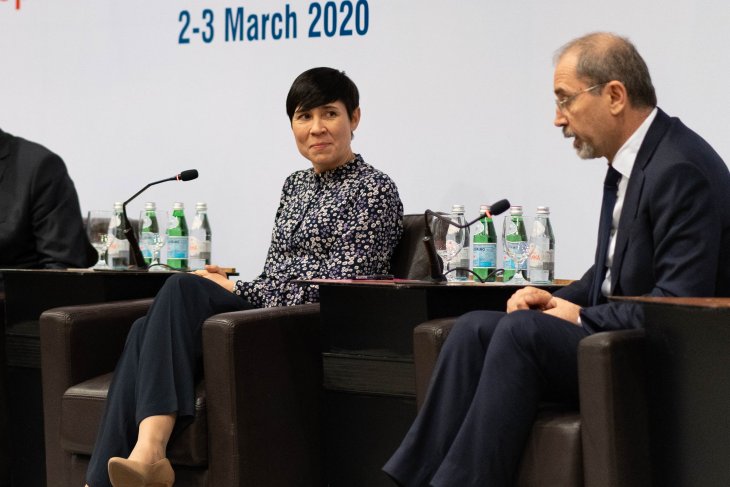
Norway’s Minister of Foreign Affairs Ine Eriksen Søreide and Jordan’s Minister of Foreign Affairs Ayman Safadi at an event in Jordan. Photo: Indigo Trigg-Hauger / PRIO
The fire at the Moria camp underlines the depth of the crisis in the international system intended to protect people fleeing their home countries. Under the Refugee Convention, people in need of asylum must be given the opportunity to apply for it. The fundamental flaws in this system weighs heavily on the international community and will dominate the political agenda for the foreseeable future. At the same time, we are now seeing a deeply irreconcilable conflict between the domestic policy considerations shaping Norway’s immigration policy and the foreign policy ambitions that the country is pursuing. While Norway prepares itself for a term on the most prestigious and respected international forum, the UN Security Council, where its opportunities to exert influence will be significant, “on the home front” its approach to one of the great challenges of our time is to wait for other countries to take the initiative.
Weakened UN structures
UNWRA, which works with Palestinian refugees across the Middle East, is in serious financial difficulty after its main funder, the United States, withdrew its support for the organization in 2018. The agency is also struggling politically, because the Trump administration has taken the issue of Palestinian refugees off the negotiating table. The Palestinian refugee problem is particularly important because it illustrates, more than any other situation, how long a refugee crisis can continue if it is not solved.
Even so, UNRWA’s responsibilities are minor compared with the burden carried by UNHCR. UNHCR, which is responsible for all other refugees worldwide, is struggling because of the enormous and ever-growing number of refugees globally, and the shortage of political and economic will to take the measures necessary to resolve the problems. Solutions involve providing housing for people in need, and also finding enduring solutions to the situations that caused them to flee in the first place. In both cases, the central role of the UN in addressing these key questions, both as an international forum and through its specialized organizations, should be obvious. At the start of 2019, there were 79.5 million refugees worldwide. At that time, UNHCR had only half the funding it required for 2020-2021.
The burden-sharing principle is central to ideas about how the international community should assist refugees, but it is not legally binding. There are no mechanisms for establishing a reasonable and just method for making countries share the burden. As a result, the system depends on some countries taking the lead, setting the standard, and then bringing others on board. It is at the same time difficult to argue against the fact that countries such as Lebanon, Jordan, Italy, Greece and Turkey are in practice bearing far more than their share of the global challenge of providing protection for refugees.
Norway on the UN Security Council
Although refugees are not directly the concern of the UN Security Council, the UN’s reputation, credibility and effectiveness are weakened if its agencies and member states fail to resolve the various longstanding refugee crises. Accordingly, some connections should be made visible here: from the burned down Moria camp via Oslo and to the UN Security Council in New York. As the Norwegian government celebrated its successful campaign for a non-permanent seat on the Security Council, the institutional difficulties concerning the protection of refugees follows it into the assembly rooms in New York.
Until Moria burned down, the Norwegian position was that Norway should contribute by accepting children from the camp, once another 10 or so countries had already gone ahead and provided assistance. It was clear that this policy was formulated with an eye on the domestic policy agenda, but if Norway is to take up one of the most important positions in international politics, then surely we should not be waiting for other countries to take the lead, so that we can follow in their footsteps. In this regard, Norway’s reputation as a major humanitarian power comes into play. Norway’s foreign-policy capital rests very much on this reputation.
Successful management of this legacy could both strengthen Norway’s position on the Security Council and encourage other countries to take their share of responsibility. This is needed.
- This article was originally published in Norwegian in Dagbladet. You can read it here.